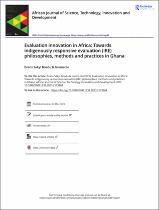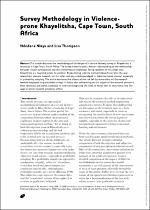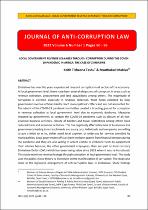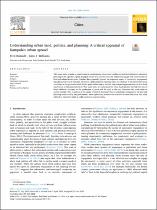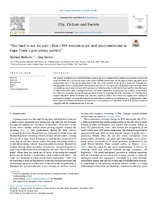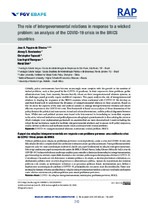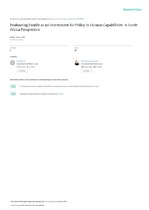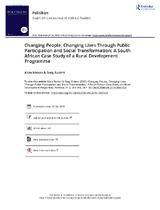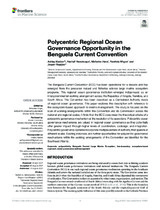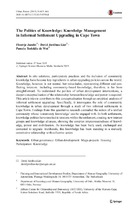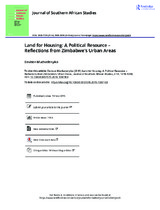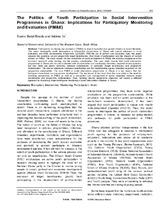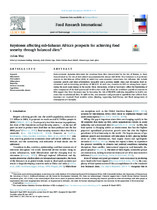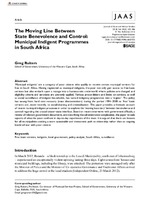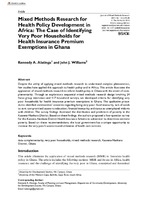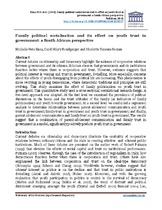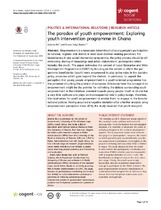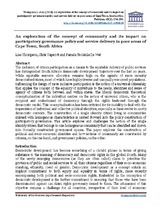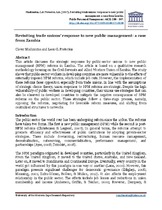School of Government
Browse by
The School of Government was established by the University of the Western Cape (UWC) in 1993 as part of a broad initiative to meet the education and training challenges of a post-apartheid society and as a means of supporting the process of social, political and economic transformation in South Africa and the Southern African region as a whole. It provides professional and academic training for the public sector at national, provincial and local levels, for NGOs, trade unions and other related organisations, and also engages in research, consultancy and policy advice.
Sub-communities within this community
Collections in this community
Recent Submissions
-
Evaluation innovation in Africa: towards indigenously responsive evaluation (ire) philosophies, methods and practices in Ghana
(African journal of science, technology, innovation and development, 2023)Evaluation within an indigenous society is a social activity. Thus, it requires both tangible and intangible or hidden factors such as cultural values, norms, communal relational structures, power dynamics, attitudes, ... -
Survey methodology in violence-prone Khayelitsha, Cape Town, Couth Africa
(Blackwell Publishing Ltd, 2009)This article discusses the methodological challenges of a service delivery survey in Khayelitsha, atownship in Cape Town, South Africa. The survey aimed to gain a better understanding of the relationshipbetween citizen ... -
Local government revenue leakages through corruption during the Covid-19 pandemic in Africa: The case of Zimbabwe
(University of the Western Cape, 2022)Zimbabwe has over the years experienced rampant corruption in all sectors of the economy. At local government level, there have been several allegations of corruption in areas such as revenue collection, procurement and ... -
Understanding urban land, politics, and planning: A critical appraisal of Kampala's urban sprawl
(Elsevier, 2020)This paper seeks to make a contribution to contemporary urban land insights and political debates in relation to planning in the Ugandan capital, Kampala. It also evaluates how the city authorities engage with communities ... -
‘This land is not for sale’: Post-1994 resistance art and interventionism in Cape Town’s precarious publics
(Elsevier, 2021)The control, regulation and commodification of space has been fundamental in reinforcing structural racism and social identities. In a city such as Cape Town, where colonial architecture and heritage as well as apartheid ... -
The role of intergovernmental relations in response to a wicked problem: An analysis of the COVID-19 crisis in the BRICS countries
(Fundacao Getulio Varagas (FGV), 2021)Globally, policy environments have become increasingly more complex with the growth in the number of wicked problems, such as that posed by the COVID-19 pandemic. In their response to these problems, public administrations ... -
Evaluating Family as an Instrument for Policy in Human Capabilities
(macrothink Institute, 2021)The capabilities" approach has overtime offers instructive insights into the improvement of human capabilities in various fields such as behavioural change, social inequalities, poverty, unemployment, and education. To ... -
Changing people, changing lives through public participation and social transformation: A south African case study of a rural development programme
(Routledge, 2020)During 2009, in what seemed to be a return to RDP-style thinking, the Comprehensive Rural Development Programme (CRDP) was adopted nationally to tackle not only underdevelopment, poverty, unemployment, and other social ... -
Polycentric regional ocean governance opportunity in the Benguela current convention
(frontiers in marine-science, 2021)The Benguela Current Convention (BCC) has been operational for a decade and has emerged from the precursor natural and fisheries science large marine ecosystem programs. This regional ocean governance institution emerged ... -
The politics of knowledge: Knowledge management in informal settlement upgrading in Cape Town
(Springer, 2015)t In situ solutions, participatory practices and the inclusion of community knowledge have become key ingredients in urban upgrading policies across the world. Knowledge, however, is not neutral, but value-laden, ... -
Land for housing: A political resource – reflections from Zimbabwe’s urban areas
(Routledge, 2015)When the Zimbabwean government launched the Fast Track Land Reform Programme (FTLRP) in 1999, an international outcry followed, with Zimbabwe described as an international pariah state. Zimbabwe entered a prolonged ... -
The terrain of urbanisation process and policy frameworks: A critical analysis of the Kampala experience
(Cogent OA, 2017)Kampala is urbanising in an unplanned manner, but without a clear picture of the underlying dynamics. The city is characterised by lack of proper zoning of economic activities and construction of physical infrastructure ... -
The politics of youth participation in social intervention programmes in Ghana: Implications for participatory monitoring and evaluation (pm&e)
(Lifescience Global Canada Inc., 2018)Participatory monitoring and evaluation (PM&E) in project evaluation has gained impetus in recent literature. This paper interrogates youth participation in intervention programmes in Ghana with special reference to ... -
Keystones affecting sub-Saharan Africa's prospects for achieving foodsecurity through balanced diets
(Elsevier, 2018)Socio-economic dynamics determine the transition from diets characterized by the risk of famine, to thosecharacterized by the risk of diet-related non-communicable disease (DR-NCD). This transition is of particularconcern ... -
The moving line between state benevolence and control: Municipal indigent programmes in South Africa
(SAGE, 2018)free in South Africa. Having registered as municipal indigents, the poor not only gain access to free basic services but also embark upon a voyage into a bureaucratic underworld where policies are changed and eligibility ... -
Mixed methods research for health policy development in Africa: The case of identifying very poor households for health insurance premium exemptions in Ghana
(SAGE, 2019)Despite the utility of applying mixed methods research to understand complex phenomenon, few studies have applied this approach to health policy and in Africa. This article illustrates the application of mixed methods ... -
Family political socialisation and its effect on youth trust in government: a South African perspective
(Taylor & Francis, 2018)Current debates on citizenship and democracy highlight the salience of cooperative relations between government and its citizens. Scholars observe that governments and its institutions function better where there is ... -
The paradox of youth empowerment: Exploring youth intervention programme in Ghana
(Cogent OA, 2018)Empowerment is a necessary determinant of young people’s participation in national, regional and district or local level decision-making processes. For inclusiveness in any social intervention programme, the policy process ... -
An exploration of the concept of community and its impact on participatory governance policy and service delivery in poor areas of Cape Town, South Africa
(Taylor & Francis, 2018)The inclusion of citizen participation as a means to the equitable delivery of public services has distinguished South Africa’s democratic development trajectory over the last 20 years. While equitable resource allocation ... -
Revisiting trade unions’ response to new public management: a case from Zambia
(SAGE Publications, 2017)This article discusses the strategic responses by public-sector unions to new public management (NPM) reforms in Zambia. The article is based on a qualitative research methodology focusing on the Civil Servants and Allied ...

